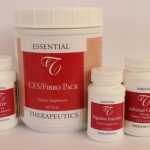How Exactly Does Lyrica Work?
 Lyrica is the first prescription medication approved to treat fibromyalgia. Because fibromyalgia patients typically do not respond to conventional painkillers like aspirin, Lyrica affects the brain and the perception of pain. Pfizer’s Lyrica, known generically as pregabalin, binds to receptors in the brain and spinal cord and seems to reduce activity in the central nervous system.
Lyrica is the first prescription medication approved to treat fibromyalgia. Because fibromyalgia patients typically do not respond to conventional painkillers like aspirin, Lyrica affects the brain and the perception of pain. Pfizer’s Lyrica, known generically as pregabalin, binds to receptors in the brain and spinal cord and seems to reduce activity in the central nervous system.
No one knows exactly how Lyrica works. But some say that Lyrica does not work well enough to have warranted its Federal Drug and Food Administration (FDA) approval. According to The New York Times, in clinical trials, patients taking Lyrica reported that their pain fell on average by about two points on a 10-point scale, compared with 1 point for patients taking a placebo. About 30 percent of patients said their pain fell by at least half, compared with 15 percent taking placebos.
In 2004, Lyrica was reviewed by the FDA as a remedy for diabetic nerve pain. The reviewers recommended against approving the drug, citing its side effects. Lyrica causes weight gain and edema, or swelling, as well as dizziness and sleepiness. According to the New York Times, in 12-week trials, nine percent of patients saw their weight rise more than seven percent, and the weight gain appeared to continue over time.
But the FDA ignored the advice of Lyrica reviewers and approved it anyway. Then Pfizer asked the FDA to expand the approved uses of Lyrica to include the treatment of fibromyalgia, and the agency did so in June. It was a good move for Pfizer. According to the New York Times, worldwide sales of Lyrica reached $1.8 billion in 2007, up 50 percent from 2006. Analysts predict sales will rise an additional 30 percent this year, helped by consumer advertising. During the first nine months of 2007, Pfizer spent $46 million on Lyrica ads alone.
While I welcome anything that will help my fibromyalgia patients, I’m not a big fan of Lyrica. Why? It doesn’t seem to offer any real long-term relief and the side effects are potentially dangerous.
Side Effects of Lyrica
There are many side effects that are considered “normal” of Lyrica. However, it should be noted that if these symptoms occur, they should be brought to the attention of the prescribing doctor. You must keep in mind that the FDA often approves drugs that will result in certain side effects. However, they do so on the notion that the benefits of the prescription will outweigh the consequences associated with side effects in the long run. The following outlines some of the “common” side effects of Lyrica: – Experiencing Weight Gain – Blurred Vision – Body Tremors – Possible Insomnia – Gastrointestinal Difficulties, i.e. Diarrhea and Constipation – Mild to Severe Headaches – Nausea – Swelling in Hands – Dry Mouth – Swelling in Ankles – Dizziness – Drowsiness – Possible Fainting
Traditional medicine alone isn’t very helpful for fibromyalgia- 70 percent of fibromyalgia patients seek out alternative methods. I encourage my patient’s to use the Essential Therapeutics Fibromyalgia Jump Start Package
Easy Ways to Make Better Nutritional Choices

An easy way to make your nutritional choices is to look for foods that are bright in color, for they usually contain more beneficial vitamins, minerals, and phytochemicals. For example, red and pink grapefruit have the heart-healthy cancer-fighting antioxidant phytochemical called lycopene while white grapefruit does not. Here are seven more simple ways to start eating healthier:
- Switch from iceberg lettuce to romaine lettuce. Romaine lettuce has more vitamins and minerals like vitamins A and C, thiamine, riboflavin, calcium, and potassium. It also has more fiber than iceberg lettuce.
- Eat brown rice instead of white rice. Brown rice naturally has more fiber and riboflavin, and less sugars than white rice. It is digested slower and is more filling.
- Switch from white bread to whole-wheat or whole-grain bread. Whole-wheat and whole-grain breads have more fiber, iron, and potassium. Slice per slice, they are more filling and satisfying than white bread.
- Drink iced teas (black, green, and herbal) instead of sodas. Black, green, and herbal teas provide antioxidants and phytochemicals that enhance your health. Unlike sodas, you can control the sugar content when brewing your own iced teas.
- Choose whole-grain or whole-wheat cereals with bran instead of sugar-coated cereals. Whole-grain cereals and whole-wheat cereals with bran naturally have more protein, fiber, calcium, iron, vitamin A, thiamin, riboflavin, and niacin than sugar-frosted cereals. Besides having less sugar, they are metabolized slower and are more filling, so you have more energy during the day and you will not get hungry right away.
- Switch from cow’s milk to fortified soy milk. Soy milk contains no cholesterol or hormones, and is extremely low in saturated fat. It also provides isoflavones and other beneficial phytochemicals that promote good health. Fortified soy milk also contains easy-to-absorb calcium, vitamins D and B-6, and some even add extra antioxidants (like vitamins A, C, and E), folate and omega-3.
- For dessert, have frozen-fruit sorbet instead of ice cream. Frozen-fruit sorbet is fat and cholesterol free and has more fiber. It is also loaded with antioxidant vitamins A and C, and contains beneficial phytochemicals.
![]()
“It is health that is real wealth and not pieces of gold or silver.”
– Mahatma Gandhi
![]()
The Benefits of Vitamin E
This study needs to be placed in context. Vitamin E has been studied for many years and there are literally thousands of citations in the scientific literature. There is solid evidence showing the benefits of vitamin E, including double-blind clinical trials, that report 400 to 800 IU of natural vitamin E can reduce heart attacks.
Vitamin E is a fat-soluble vitamin and a powerful antioxidant that has been touted for its numerous potential health benefits. Vitamin E can help you stay healthy and fight some of the most common and deadly diseases. Research has shown that vitamin E may help prevent or mitigate the effects of chronic diseases such as heart disease, cancer, Alzheimer’s disease, and diabetes.

Reduces the Risk of Heart Disease by 30-40 percent. A number of studies have associated lower rates of heart disease with higher vitamin E intake. The largest study to date on vitamin E and heart disease was conducted by researchers at Harvard University. The study looked at approximately 90,000 nurses and their intake of vitamin E. The results suggested that the incidence of heart disease was 30-40 percent lower among nurses with the highest intake of vitamin E from diet and supplements. Very similar results were found in approximately 40,000 men in the Health Professionals follow-up study. The men who took vitamin E supplements reduced their risk of heart disease by 37 percent.
Lowers Risk for all Mortality by 27 Percent. An extensive study of approximately 11,000 seniors done at the National Institute of Aging found that elderly people who supplemented with Vitamin E had a 27 percent lower risk of all-cause mortality, a 41 percent reduction in heart disease, and a 22 percent reduction in death from cancer. Vitamin E may also protect against the development of some cancers. Some evidence associates higher intake of vitamin E with a decreased incidence of cancer.
Reduces the Risk for Colon Cancer by 66 Percent. The Iowa Women’s Health Study has demonstrated a very strong protective effect for vitamin E. This was a large scale 4-year study of 35,000 women between 55 and 66 years of age who had no previous history of cancer. The results showed convincing information that a high intake of vitamin E was associated with a reduced risk of colon cancer. Risk of colon cancer was reduced by 66 percent for women taking the highest amount of vitamin E (up to 200 IU).
Reduces Risk of Bladder Cancer by 40 Percent. In almost all of the cases, the women with a high intake of vitamin E were taking supplements. The American Cancer Society recently released the results of a long-term study that evaluated the effect of vitamin E and C supplements on bladder cancer mortality. The study followed 1,000,000 adults for a 15-year period and found that those who regularly consumed vitamin E supplements for at least 10 years were 40 percent less likely to die from bladder cancer.
Vitamin E, Multivitamins, and Alzheimer’s. Prevent Alzheimer’s: Not a single older person who took separate doses of vitamin E (200-800 IU) or vitamin C (500-1000 mg) developed Alzheimer’s disease during a four-year double blind study. Subjects who took multivitamin supplements with low doses of vitamin E (typically 30 IU) or vitamin C (60 mg) had no reduction in risk of Alzheimer’s. -Chicago’s Rush Institute for Healthy Aging.
Boosting the Immune System with Vitamin E. Boost Immune System: Taking 200 IU of natural vitamin E daily boosted immune functioning in older people. A supplement with only 60mg vitamin E daily did not improve immune functioning. Obviously, superior immune functioning lessens infections, possibly cancer, and heart disease. – Tufts University
Longevity and Vitamin E. Prolong Life: Taking vitamin E and vitamin C (in higher doses than in a multivitamin) cut chances of death from all causes by 42 percent. Vitamin E users were 47 percent less apt to die of heart disease and 59 percent less likely to die of cancer. – National Institute on Aging
The benefits of vitamin E are substantial. I suggest that you encourage your patients to continue taking vitamin E and products including a daily multivitamin. At the risk of sounding paranoid, I venture that we will continue to see an increase in “studies” that attempt to present vitamins, minerals, and herbals as dangerous.
It wasn’t that long ago that the U.S. government, along with the AMA and FDA, made it illegal to even imply that essential fatty acids (omega-6 and omega-3 oils) had any relationship to of the heart and arteries diseases. To do so was labeled a criminal offense! In May of 2003, The White House urged health agencies to encourage Americans to increase their consumption of foods rich in omega-3 fatty acids and to decrease their intake of harmful trans-fatty acids. The New England Journal of Medicine, July 11, 2002;347:81-88, 132-133 It is estimated that if every American regularly took fish oil supplements or consumed two coldwater fish a week, it would save 150,000 lives a year.
![]()
A Few Vitamin Facts …
1. Slash Cancer Odds: Taking 200 micrograms of selenium daily for four and a half years cut cancer rates by 42 percent and cancer deaths in half in a group of 1300 individuals. The incidence of colorectal cancer dropped 64 percent and prostate cancer an amazing 69 percent! -University of Arizona.
2. Prevent Alzheimer’s: Not a single older person who took separate doses of vitamin E (200-800 IU) or vitamin C (500-1000 mg) developed Alzheimer’s disease during a four-year double-blind study. Subjects who took multivitamin supplements with low doses of vitamin E (typically 30 IU) or vitamin C (60mg) had no reduction in risk of Alzheimer’s. -Chicago’s Rush Institute for Healthy Aging.
3. Boost Immune System: Taking 200 IU of natural vitamin E daily boosted immune functioning in older people. A supplement with only 60 mg vitamin E daily did not improve immune functioning. Obviously, superior immune functioning lessens infections, possibly cancer and heart disease. -Tufts University.
4. Stop Heart Attacks: A daily dose of 400-800 IU of natural vitamin E cut subsequent heart attacks in men with heart problems by an astonishing 77 percent. Other research shows it takes 400 IU of vitamin E to squelch toxicity (oxidation) of LDL cholesterol. -Cambridge University, England.
5. Stop Strokes: High doses of B vitamins decreased the amount of plaque in carotid (neck) arteries by 10 percent during a four-year study. Blocked carotid arteries can cause strokes. Plaque increased by 50 percent in nonvitamin B takers. Doses: 250mcg B-12, 25mg B-6 and 2500mcg folic acid. Note: 800mcg folic acid is effective for most people, said the researchers. -University of Toronto.
6. Prevent Fractures: Taking 500mg of calcium and 700 IU of vitamin D daily for three years significantly cut the rate of bone loss and nonvertebral fractures in men and women older than age 65. -Tufts University.
7. Save Vision: Women taking vitamin C supplements cut their risk of cataracts by 77 percent. In patients with early macular degeneration, taking daily doses of 500mg vitamin C, 400 IU of vitamin E, 80mg zinc, 2mg copper and 15mg of beta carotene for 11 years slowed progression to the advanced stage of loss of vision. -Tufts University and the National Institutes of Health
8. Prolong Life: Taking vitamin E and vitamin C (in higher doses than in a multivitamin) cut chances of death from all causes by 42 percent. Vitamin E users were 47 percent less apt to die of heart disease and 59 percent less likely to die of cancer. – National Institute on Aging.
![]()
What Does Love Mean to You?
 A group of professional people posed this question to a group of 4 – 8-year-olds, “What does love mean?”
A group of professional people posed this question to a group of 4 – 8-year-olds, “What does love mean?”
When my grandmother got arthritis, she couldn’t bend over and paint her toenails anymore. So my grandfather does it for her all the time, even when his hands got arthritis too. That’s love. – Rebecca (age 8)
Love is when a girl puts on perfume and a boy puts on shaving cologne and they go out and smell each other. – Karl (age 5)
Love is when you go out to eat and give somebody most of your French fries without making them give you any of theirs. – Chrissy (age 6)
Love is what’s in the room with you at Christmas if you stop opening presents and listen. – Bobby (age 7)
Love is when you tell a guy you like his shirt, then he wears it every day. – Noelle (age 7)
My mommy loves me more than anybody. You don’t see anyone else kissing me to sleep at night. – Clare (age 6)
Love is when your puppy licks your face even after you left him alone all day. – Mary Ann (age 4)
You really shouldn’t say ‘I love you’ unless you mean it. But if you mean it, you should say it a lot. People forget. – Jessica (age 8)
![]()
Vitamin E Benefits
Vitamin E Benefits Those with Alzheimer’s
 Patients with moderately severe Alzheimer’s disease were studied for two years. The patients were given large doses (2,000 IU) of vitamin E, Eldepryl (selegiline hydrochloride), or a placebo for two years. In the patients who received vitamin E, there was a significant delay in disease progression. This study shows that Alzheimer’s patients may live longer and remain in better health if they take high doses of vitamin E.
Patients with moderately severe Alzheimer’s disease were studied for two years. The patients were given large doses (2,000 IU) of vitamin E, Eldepryl (selegiline hydrochloride), or a placebo for two years. In the patients who received vitamin E, there was a significant delay in disease progression. This study shows that Alzheimer’s patients may live longer and remain in better health if they take high doses of vitamin E.
Vitamin E Benefits those with Diabetes
Diabetes mellitus is one of the most common diseases in the world. Researchers have found that oxidative damage may play a strong role in the damage to tissues caused by diabetes as well as the complications of diabetes. The results show that when these patients took 400 IU of vitamin E daily, they reduced their risk of heart attack by 43 percent, and their risk of dying of heart disease by 55 percent. Since cardiovascular disease is the major cause of death in people with diabetes, vitamin E may have a strong positive impact on health outcomes in diabetics.
Vitamin E Lowers Cancer Risk in Smokers
Scientists from the National Cancer Institute, working together with scientists in Finland, studied 30,000 male smokers in Finland and found that those who took a Vitamin E capsule every day for five to eight years had a 30 percent reduction in the number of cases of prostate cancer and a 40 percent reduction in the number of deaths from prostate cancer. And this is really exciting because in this country, we expect about 40,000 men to die from prostate cancer this year.
Prevent Heart Attacks with Vitamin E
Stop Heart Attacks: A daily dose of 400-800 IU of natural vitamin E cut subsequent heart attacks in men with heart problems by an astonishing 77 percent. Other research shows it takes 400 IU of vitamin E to squelch toxicity (oxidation) of LDL cholesterol. – Cambridge University, England
Prevent Strokes with Vitamin E
Stop Strokes: High doses of B vitamins decreased the amount of plaque in carotid (neck) arteries by 10 percent during a four-year study. Blocked carotid arteries can cause strokes. Plaque increased by 50 percent in nonvitamin B takers. Doses: 250mcg B-12, 25mg B-6 and 2500mcg folic acid. Note: 800mcg folic acid is effective for most people, said the researchers. – University of Toronto
Traditional medicine alone isn’t very helpful for fibromyalgia – 70 percent of fibromyalgia patients seek out alternative methods. I encourage my patients to use the Essential Therapeutics Fibromyalgia Jumpstart Package.
